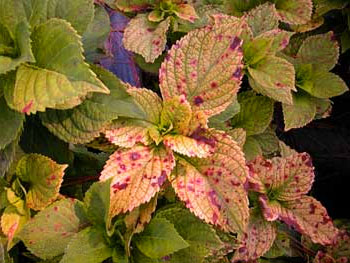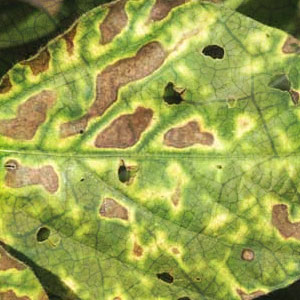Plant fungus and diseases can attack even the healthiest of garden plants and create damage by various pests. The other garden pest that can cause real havoc in your garden is disease. There are hundreds of different kinds of fungi and diseases that can attack your plants.
No matter what the underlying cause is, you can spot plant diseases fairly easily.

When plants first show signs of damage, look for any leaves that are wilting, have moldy coatings, rusts, blotches, scabs, or rotted tissue. If your plants start to develop those symptoms then chances are good that they have a fungus or a disease. Plant diseases can spread fast in combination with wet weather, poor drainage, or inadequate airflow. Regular clearing of accumulated weeds and dead stalks rob pests of their favorite breeding places, and well-drained plant beds eliminate the moist favored by fungi. Knocking insects off plants with water from a garden hose or snipping off diseased leaves are some of the simple measures that are often effective.
There are many ways to combat plant fungus and diseases. Some of them are natural, some are not. In combating such threats, an ounce of prevention is worth more than a pound of chemicals. The wise gardener avoids powerful broad-spectrum insecticides that can eliminate both beneficial and harmful insects and leave residues that may eventually affect animals and even humans. Formulas compounded to control specific pests and diseases, available under various brand names, are preferable.
Natural Fungicides and Plant Disease Cures

An increasingly attractive alternative to chemical spraying and dusting–and that avoids their possible harmful side effects–is the introduction into the garden of certain insects and disease carrying bacteria that prey exclusively on pests.
There are many all natural fungicides and plant disease treatments that you can buy to help combat these diseases. Are they effective? It depends on the product.
Some of them can be very effective. Many are specialized to treat a specific problem so you will need to know what fungus or disease your plants have before you buy a product to fight it. There are also lots of books and websites that give recipes for fungicides made from products that you probably have around the house or can get at the grocery store.
Are Natural Fungicides Effective?
Most natural fungicides are just as effective as chemical pesticides and fungicides but don’t have the risks that are associated with chemical products. While chemical fungicides and pesticides may be the most effective pest control for farmers, experts agree that whenever possible you should use natural pest control methods to minimize the health risks to you, your family, your neighbors, and your pets.
To learn more about natural ways to control plant fungus and diseases infestation in your garden, go to the local library. The library will have information about those types of fungus and what types of pests are common in your area and can give you information on how to control them. Knowing what you’re up against and how to fight it can make the difference between losing your garden to pests and creating the pest-free garden of your dreams.
Click here to Return from Plant Fungus and Diseases to Basics of Gardening